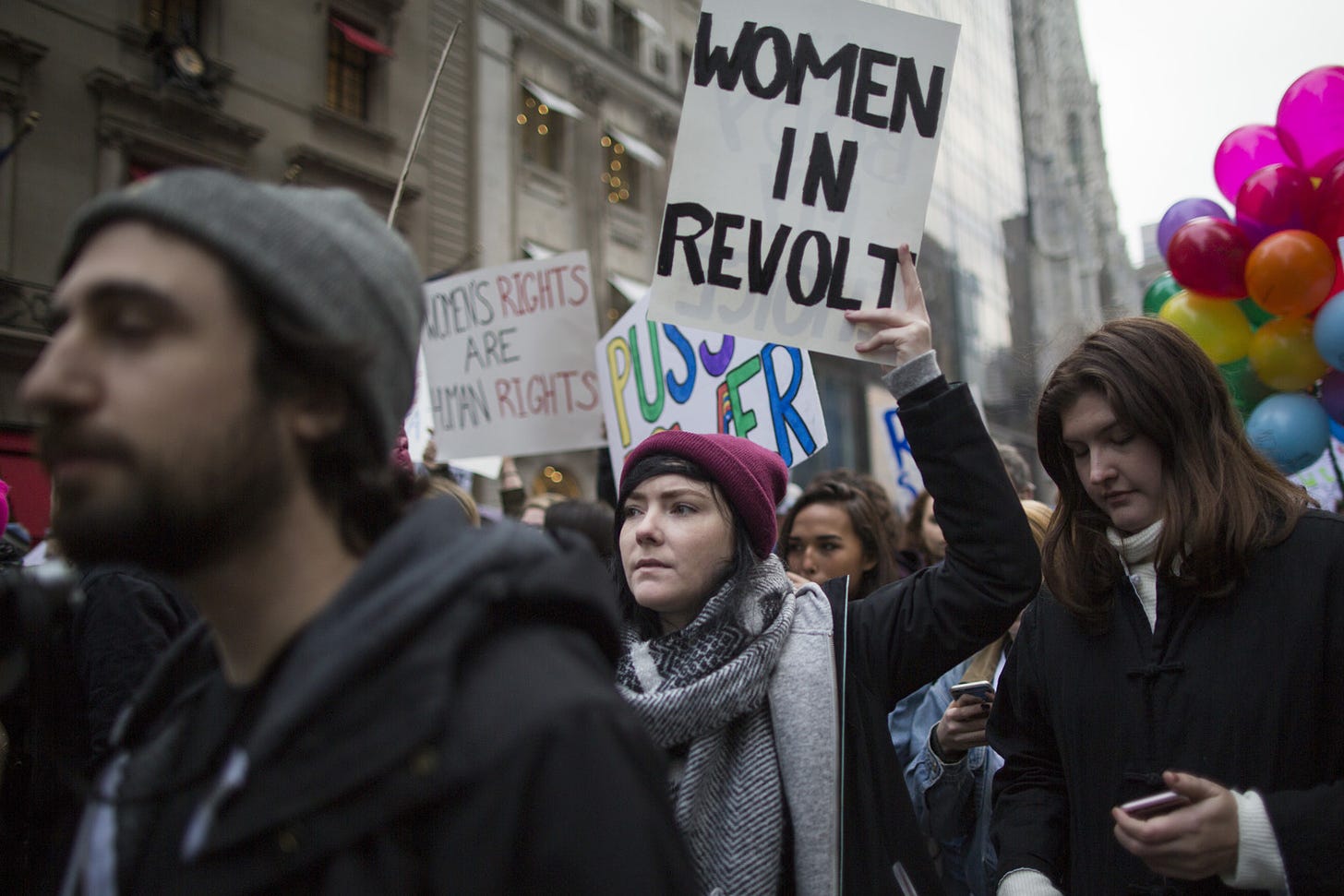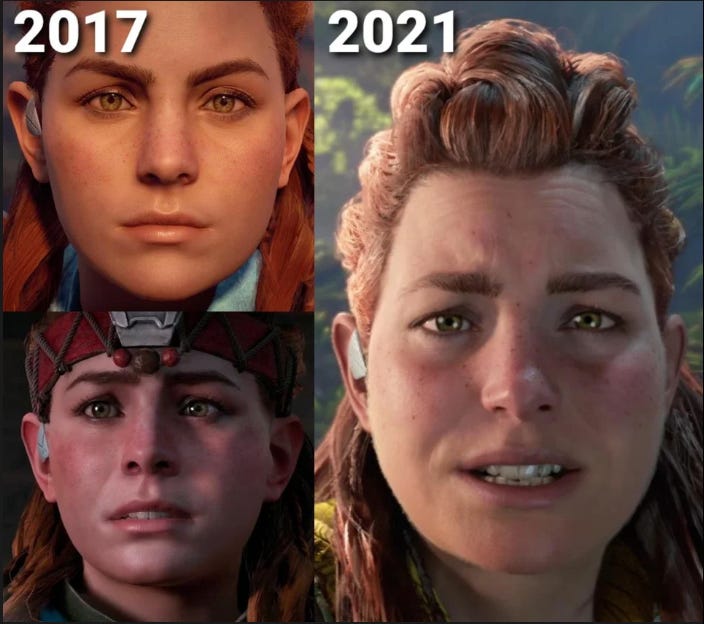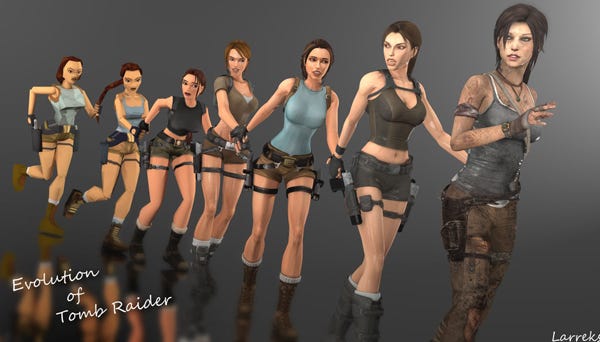Feminism as Entitlement - Pt. 3.2
A Worldview of Prickliness and Insecurity, Enabled by Cultural Entitlement
Previous entries in this series:
Feminism as Entitlement - Pt. 1
Collecting massive social privileges while still considering yourself aggrieved (and automatically justified) creates a sense of entitlement
Feminism as Entitlement - Pt. 2
Ignoring the unique roles and functions of women and abandoning a coherent vision for society has created a sense of entitlement
Feminism as Entitlement - Pt. 3.1
Conceptualizing Your Personal Choices & Opportunities as a Political Battleground Engenders a Sense of Entitlement
Harrison Butker stirred up the kind of chaotic controversy which instantly seemed to involve half of the country… and which absolutely no one cares about now (a few weeks later). Such is the media landscape in 2024. What did he do? He gave a commencement speech at a Christian college in which he stated some personal views which are consistent with the views of many (if not most) Americans.
I’m not interested in addressing Butker’s remarks or the controversy. I only mention it as exhibit A in my claim that we live in a culture in which personalizing (and projecting) based upon the comments and ideas of famous figures, and objecting to these statements using political language (and emotionally motivated reasoning) is incredibly common. Personalization and projection are mental health concepts, by the way. Keep that in mind… we’ll return to it.
What did Butker say? Well, lots of things, but probably the most inflammatory (although not the most politically salient) was his promotion of the roles of wife and mother and homemaker, using his own wife as a celebration and an example.
Why would the comments of a professional athlete regarding his own opinions about the importance and value of motherhood and homemaking bother anyone?
There’s a simmering media controversy around Sweet Baby Inc and the insertion of political messaging in video games. Much of this is ‘soft’ messaging (using visual cues and story elements and subtle changes to game worlds and characters) but it is certainly happening. When confronted with people who say it is NOT happening… ask them: do you think video games and media in general needs to change their portrayal of women and masculinity? Their answer will nearly always be ‘yes’, whereupon you can point out that perhaps game developers and software companies think so as well. Never trust someone who claims that something is definitely not happening when the thing is something they really want to happen and those desires are shared by millions of people.
In this case it seems fairly obvious that mechanism of ESG scores are mostly driving the strange changes we see in games: game developers employ ‘diversity consultants’ (like SBI) whose only contribution is to grow the progressive marginalia crammed into these games (and criticize disparaging voices on Twitter), helping to ensure further financing opportunities in the future. The video game market is over $250 BILLION annually and the trajectory of growth will see that number more than double in the next 7-8 years. This is a HUGE profit machine… and most consumers are male. Whereas app-based phone games appeal more to women console-based and multiplayer and FPS games’ growth are driven largely by men (and boys). I’m not a gamer and I never have been but it is impossible not to encounter this activity in the modern world. Gaming now is bigger than film, and growing MUCH faster.
So this huge share of the economy, which caters disproportionately to men, especially young men, is intentionally changing game contents and dynamics in order to introduce divisive and unpopular elements. Strange, no? Perhaps the most unpopular is the widespread ‘uglification’ of female characters. This is DEFINITELY happening. Dozens of games released in the past few years (including some of the largest budgeted ones) intentionally changed previous female characters or edited the digital avatars of face and body models. All of these changes have been made in one direction: smaller breasts, wider shoulders, bigger arms, bigger chins, stockier build. In other words, dozens of female characters have been made less femininely attractive and decidedly more masculine. NO characters (that I’m aware of) have been altered in the opposite direction and male characters retain their handsome visages and large, muscular builds (even when these builds represent completely “unrealistic body standards”).
Examples of changes, all from the past few years:
Sweet Baby, Inc. is one of these ‘diversity consultants’ which has been tied to a number of projects which have evidenced these (and other intentional and politically-charged) changes. Notably, these projects have underperformed, nearly across the board. OF COURSE they have! Why would companies deliberately hobble themselves and make main characters in visual and immersive stories deliberately much less appealing? That’s a question for another day. I’m currently writing about ESG but its tendrils extend over such vast expanses of society and the economy, and its operations are so secretive, that it is both difficult to research and anxiety-provoking to contemplate. There should be no imperative more important to companies than turning profits and the fact that there is now a new set of political considerations which contradict and often overrule fiduciary responsibility is frankly sinister. But why would progressive developers WANT to change these characters in these ways? Keep in mind, these are not THEIR characters. To invest the hundreds of hours and sustain the professional risk to make these changes the existence of attractive and buxom and feminine characters must really bother some people.
Why would the existence of beautiful women and their prominence in video games bother anyone?
We live in an era of weird ephemera that emerge and vanish like bubbles in the surf. They pop into existence on the phantasmagorical plane of ‘online’ and gather some support, generate some content, often provoke some opposition and maybe even analysis (from so-called ‘journalists’ who spend their days writing completely unsupported opinions about things that almost no one cares about) and then fade away… memetic husks waiting to be revived in a new iteration of banality.
Some folks hoped that by 2024 we would be turning our energies to interplanetary colonization or creating new and unimaginable artistic masterpieces or building marketable quantum computers or something. Instead we have a lot of rich and bored people who amuse themselves with reels and photos and texting and posting… and are often beginning to mistake their subjective (and largely) realities for the physical world. God help us.
One of these strange phenomena is the ‘trad wife’ content creator. I know very little about this niche, as I’ve never viewed any of their content, and only know of it from second- and third-hand accounts, but from what I understand there are many young women online who have created a kind of social media identity around being wives and homemakers and mothers and shoppers and cooks. They self-consciously ape traditional values and activities and they spurn professional aspirations and the empty imperatives of modern feminism.
The reason I bring trad wives up here is that their appearance has provoked worry and anger among the commentariat. They are spoken of with disgust by legacy media outlets (example here and here and here, etc.) and dragged on X and linked to racism (of course!) and ‘far Right’ elements (of course!). But… isn’t a trad wife just a digital advertisement for values which many societies have displayed (to some extent) for centuries? Aren’t they just kind of the Pennsylvania Dutch of TikTok? People who worry about the loss of agency or the lure of their lifestyles for young people don’t seem to care about the loss of agency engendered by participation in radical Leftist political organizations, or the lure of online gender ideology. (Trad wife values are anxiety-provoking because of the risk of social contagion, apparently; trans and non-binary lifestyles, which are 100x more prominent and celebrated, involve no risk. Okay). The central question is why anyone would care if content creators are simply living their own values and making videos about cooking and taking care of their husbands.
Why would a digital meme focused on promoting the traditional roles of wife and mother and homemaker bother anyone?
It is a generally sound rule that happy and secure people are less envious and irritable and spend less time worrying about other people. Politics antagonizes every participant (or observer) to some extent, yet I’m happy that there are such things as drag queens and socialists and pro-Palestinian protesters and environmentalists in the world. I do not WANT society to reflect my narrow preferences or beliefs! I doubt the wisdom or usefulness of the efforts of these kinds of people sometimes, and I think that children should not be exposed to adults who fervently want to teach them radical and controversial ideas about the world for their own ends, but their existence does not bother me. Their prominence does not bother me (I just wish the media and our culture reflected the range of opinion on these matters better). I am not threatened by popular speeches or video games or TikTok trends. Ever.
I make an effort to avoid envy and insecurity, like the psychological plagues they are. I have no ongoing project to change womanhood forever to suit my political compulsions and emotional biases. I mentioned that personalization and projection are mental health concepts. They are. They are only possible among people who are comfortable and free (and entitled) enough to spend time worrying about such things, and about other people. They also indicate poor mental health (at least in the affected areas) and some degree of unhappiness. People prone to criticism and envy and projection are not people who should be in power.
Feminists often frame their objections (for they’re always objecting to something) as moves on behalf of women, or resistance of patriarchy, but they don’t speak for most women. Even within the United States their ideas are met with neutral receptions, at best. Globally they are a bizarre phenomenon and are rightly viewed as the products of privilege and idleness and naiveté that they are. Conversely, when it comes time to actually support women fighting for their rights (like anti-hijab protesters at the Woman’s March in D.C.) or advocating for women allegedly victimized by sexual violence (like Israeli women raped on Oct. 7) they fall silent. They have no answer to these points but they are instructive for the rest of us.
Feminism began as an umbrella term to describe activism by upper-class women on behalf of women as a group. It is now simply a flavor of Leftist ideology and so when women (or womanhood) must be sacrificed in favor of the ideology, that is what happens. This ideology is based upon envy and resentment. They don’t want civil equality for women-in the U.S. they more or less have that. They want the power of men.
Every reminder that they are limited by biology and endowed with the animal role of lifegiver and partially defined by their appeal to human males is a thorn in their psyche, and they react with bitterness and censoriousness. Can you think of another reason for the questions I’ve posed here, as well as the dozens of similar ones that anyone surveying contemporary culture will encounter?












